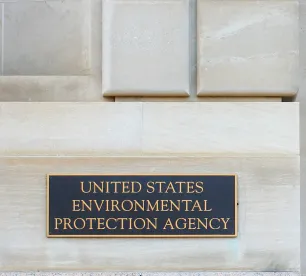On Thursday, March 26, the United States Environmental Protection Agency (“U.S. EPA”) released a much anticipated enforcement discretion policy that provides temporary and limited enforcement discretion for certain violations of some environmental laws in light of the anticipated effects of the COVID-19 pandemic on environmental compliance matters (the “COVID-19 Policy”). The COVID-19 Policy is temporary, and applies retroactively to March 13, 2020 with an uncertain end date. U.S. EPA confirmed that it will provide parties with at least seven days notice prior to terminating the COVID-19 Policy.
The policy provides important guidance to the regulated community about managing environmental compliance as they respond to numerous state and local orders, including temporary facility closures and reductions in operations and staffing.
The COVID-19 Policy states that U.S. EPA will exercise enforcement discretion for certain environmental compliance requirements, including operational requirements and routine monitoring and reporting under environmental laws enforced by the U.S. EPA. EPA officials have stated that the policy is “not a nationwide waiver of environmental rules.” Rather, EPA frames its policy as a method of focusing the agency’s limited resources on “situations that may create an acute risk or imminent threat to public health or the environment,” while at the same time recognizing that the COVID-19 pandemic “may affect facility operations and the availability of key staff and contractors and the ability of laboratories to timely analyze samples and provide results.”
Key aspects of the Policy are summarized below.
I. The COVID-19 policy is not a free pass for non-compliance.
The U.S. EPA’s general enforcement discretion is conditioned on entities making every effort to comply with their environmental compliance obligations. However, where compliance is not “reasonably practicable,” facilities are advised to:
a.Act responsibly under the circumstances to minimize the effects and duration of any COVID-19-related noncompliance;
b.Identify the specific nature and date of the noncompliance;
c.Identify how COVID-19 was the cause of the noncompliance, and the decisions and actions taken in response, including best efforts to comply and steps taken to come into compliance at the earliest opportunity;
d.Return to compliance as soon as possible; and
e.Document the information, action, or condition specified in (a) through (d).
II. The COVID-19 Policy Provides Enforcement Discretion for Certain Compliance Reporting and Monitoring Violations.
The COVID-19 Policy recognizes that pandemic-related business interruptions may constrain the ability of regulated entities to perform certain routine compliance monitoring, testing, reporting, training or certification. U.S. EPA advises entities to use existing procedures to report noncompliance with routine activities, including any obligations under applicable permits, regulations or statutes.
Accordingly, the COVID-19 Policy states that U.S. EPA does not expect to seek penalties for violations of routine compliance monitoring, integrity testing, sampling, laboratory analysis, training, and reporting or certification obligations “in situations where EPA agrees that COVID-19 was the cause of the noncompliance, and the entity provides supporting documentation to EPA upon request.”
Limited Period
The discretionary treatment provided by the policy is only available during the term of the COVID-19 Policy, and EPA expects entities to return to full compliance as soon as possible once the policy is no longer in effect. The COVID-19 Policy also states that U.S. EPA “does not plan to ask facilities to “catch-up” with missed monitoring or reporting if the underlying requirements applies to intervals of less than three months.” However, entities are expected to take reasonable measures to resume all compliance activities and to submit monitoring or certifications required on a bi-annual or annual basis after the COVID-19 Policy is no longer in effect.
Signatures
The agency also acknowledged the difficulty of obtaining “wet” signatures for certain filings and submissions, and will accept digital or other electronic signatures during the effect of the COVID-19 Policy. Here, U.S. EPA will be less lenient, noting that the “mere inability to obtain a “wet” signature will not be considered a justification for failure to make a paper submission or certification.” As such, entities should be sure to coordinate on submissions using digital or electronic signatures.
Settlement Agreements and Consent Decrees
The COVID-19 Policy states that U.S. EPA intends to treat routine compliance monitoring and reporting under settlement agreements and consent decrees in a similar fashion, and parties subject to these agreements should us the notice procedures in them (including the force majeure provisions, as applicable) to notify of any non-compliance. The COVID-19 Policy states that U.S. EPA will coordinate with the Department of Justice regarding stipulated penalties for routine compliance obligations, and will consult with co-plaintiffs to seek agreement. The COVID-19 Policy cautions, however, that courts retain jurisdiction over consent decrees and may exercise their own authority, including any potential enforcement by other parties. As such, entities subject to such agreements and decrees should be cautious with relying on the COVID-19 Policy for failure to comply with any applicable obligations, and should ensure compliance to the greatest extent possible.
III. Facility Operational Considerations
The COVID-19 Policy also addresses a number of specific operational scenarios, as follows:
-
Imminent threats to human health or the environment. For situations involving an imminent threat to human health or the environment (for example, a release of hazardous materials), or a failure of air emission control, wastewater, waste treatment systems, or other facility equipment that might result in exceedances of enforceable emissions limits, facilities should contact the appropriate implementing authority (U.S. EPA or the authorized state). U.S. EPA will consult with the authorized state (if applicable) in accordance with existing U.S. EPA federal/state civil enforcement guidance. U.S. EPA will consider the totality of the circumstances, including the COVID-19 pandemic, when determining whether an enforcement response is appropriate.
-
Hazardous waste generation. If a facility is a generator of hazardous waste that, due to COVID-19 disruptions, is unable to transfer hazardous waste offsite within the time periods prescribed by RCRA, the facility should continue to properly label and store the waste and make the COVID-19 exigency notification to EPA described above. If these steps are taken, as an exercise of enforcement discretion, EPA will treat these entities as hazardous waste generators and not treatment, storage, and disposal facilities. In addition, as an exercise of enforcement discretion, EPA will treat Very Small Quantity Generators and Small Quantity Generators as retaining that status, even if the amount of hazardous waste stored onsite during the COVID-19 pandemic exceeds a regulatory volume threshold.
-
CAFOs. If a facility is an animal feeding operation that meets the regulatory definition of a concentrated animal feeding operation (CAFO) due to an inability to transfer animals offsite, as an exercise of enforcement discretion, EPA will not treat such operations as CAFOs.
-
Infrastructure. If a facility is essential critical infrastructure, EPA may consider a more tailored short-term No Action Assurance, with conditions to protect the public, if in the public interest. Such determinations will be made by the OECA Assistant Administrator on a case-by-case basis.
IV. Certain Activities are Excluded from Coverage Under the COVID-19 Policy.
The agency identified a number of activities that are not covered by the COVID-19 Policy:
1. Criminal violations or conditions of probation in criminal sentences. The agency will, however, distinguish violations that facilities know about and which are unavoidable as a result of COVID-19 restrictions from violations that are the result of an intentional disregard for applicable law.
2. Import Requirements. U.S. EPA is particularly concerned about pesticide products entering the United States that claim to address COVID-19 impacts, and as such the COVID-19 Policy does not apply to imports. Although pesticides are specifically referenced, the general exclusion of import requirements would also apply to any requirements under the Toxic Substances Control Act.
3. RCRA and CERCLA settlements. Activities carried out under Superfund and RCRA corrective action are not covered by the COVID-19 Policy. The policy states that these matters will be addressed in a separate communication.
4. Accidental releases. Nothing in the COVID-19 Policy relieves an entity from responsibility to prevent, report, or report accidental releases of oil or hazardous substances in accordance with federal law, nor should it be read as a willingness by U.S. EPA to exercise enforcement discretion with respect to such a release. As such, any releases of a reportable quantity should be reported in accordance with applicable laws.
5. Public Water Systems. The COVID-19 Policy recognizes that public water systems are of particular importance during the COVID-19 pandemic and expects operators of these systems to continue normal maintenance and operations.
6. EPA’s Policy Does Not Bind States or Tribes. The policy applies to U.S. EPA actions only. Although the COVID-19 Policy calls for EPA to coordinate with states and tribes on enforcement efforts, states and tribes remain free to establish their own enforcement discretion policies. While some states (and tribes) have issued such policies, others have not. Foley’s environmental group is tracking state enforcement policies in real time during the COVID-19 pandemic.
V. Practical Implications and Considerations
Although U.S. EPA will apply enforcement discretion as discussed above, companies should continue to make their best efforts at compliance and should use existing procedures to report noncompliance with routine compliance obligations (including applicable permits or regulations). If compliance is not “reasonably practical” and no such procedure is applicable, companies should carefully document and maintain the information internally and make it available to U.S. EPA upon request. Some specific examples of routine monitoring and reporting obligations cited by U.S. EPA as being subject to the COVID-19 Policy include:
| Clean Air Act (CAA) | Clean Water Act (CWA) | Resource Conservation and Recovery Act (RCRA) |
| Continuous Emissions Monitoring Systems (CEMS) and stack tests
Relative accuracy test results (RATA) Leak Detection and Repair (LDAR) monitoring Fenceline monitoring Reciprocal Internal Combustion Engine (RICE) readings and monitoring CAA Section 129 renewals TRI and greenhouse gas reporting |
Effluent sampling
Quarterly or other routine stormwater inspections and sampling Cooling tower sampling SPCC training |
Hazardous waste trainings
90-day holding periods for onsite hazardous waste |







 />i
/>i

